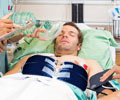
‘Out-of-hospital cardiac arrest is the third leading cause of death worldwide.’
Tweet it Now
"The high mortality from cardiac arrest in the community emphasises the need to identify those at risk," said study author Dr. Nertila Zylyftari of Copenhagen University Hospital Herlev and Gentofte, Hellerup, Denmark. "This is very challenging since these are considered sudden and unexpected events. But our study indicates that patients felt unwell in the days leading up to the cardiac arrest."Previous studies have reported that some patients had symptoms such as shortness of breath, chest discomfort and palpitations in advance of a cardiac arrest and contacted the healthcare system. But there is little information on when and where these contacts occurred.
This study investigated contacts with GPs and hospitals in the year before a cardiac arrest. To get a picture of whether there was any variation throughout the year, the researchers examined each week separately. In other words, what proportion of patients contacted a GP or hospital 52 weeks before the arrest, 51 weeks before, and so on, up to one week before.
The researchers used the Danish Cardiac Arrest Registry to identify all residents who suffered a cardiac arrest outside of hospital in Denmark between 2001 and 2014. Using the unique civil registration number assigned to all Danish citizens, the researchers linked information from several national administrative registries, including dates of GP and hospital contacts.
A total of 28,955 people had an out-of-hospital cardiac arrest during the 14-year study period. The median age of victims was 72 years and 67% were men. To compare the results in cardiac arrest patients with the overall population in Denmark, each patient was matched by age and sex to nine people from the general public.
Advertisement
As for hospital contacts in the year before the arrest, these were relatively constant for the first six months. Each week during that six months, around 3% of patients contacted a hospital. Weekly contacts then gradually increased during the next six months, peaking at two weeks before the arrest, when 6.8% of patients contacted a hospital. Every week during that same year, just 2% of people in the matched population contacted a hospital.
Advertisement
"It was surprising to see that in the two weeks prior to the cardiac arrest there was an increase in contacts especially with their own doctor," she added.
In a separate analysis, the researchers examined all contacts made to the healthcare system (either GP, hospital or both) during the two-week period prior to the cardiac arrest. This showed that 58% of cardiac arrest patients had contacted the healthcare system compared to 26% of the matched population.
Information was not collected on the reasons why cardiac arrest patients sought medical advice. But the data show that of those who communicated with their GP during the two-week period before the event, 72% did so by phone or email and 43% had a face-to-face consultation. (Some did both, which is why the total exceeds 100%.) Meanwhile, 25% of the cardiac arrest patients who visited hospital during the two-week period before the event had cardiovascular disease.
Dr. Zylyftari said: "More data and research are needed on the reasons for these interactions - for example symptoms - to identify warning signs of those at imminent danger so that future cardiac arrests can be prevented."
Source-Eurekalert













